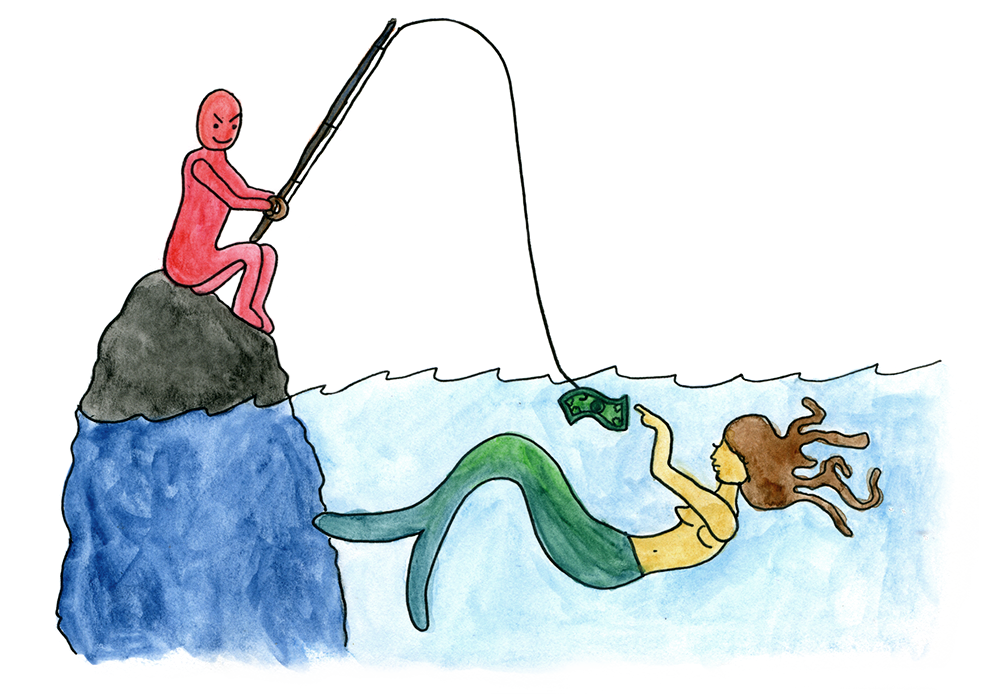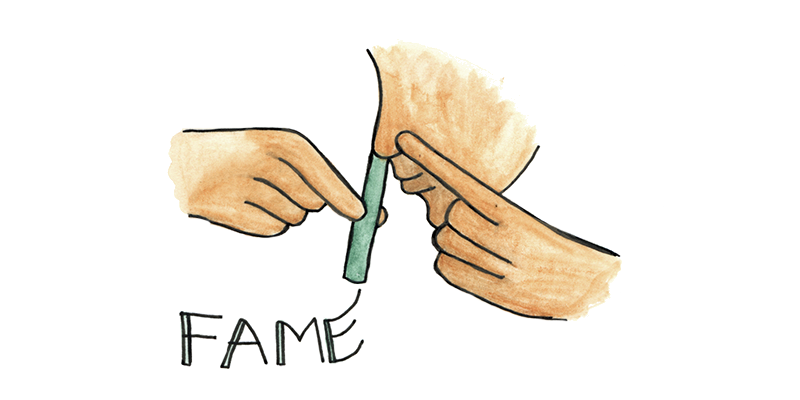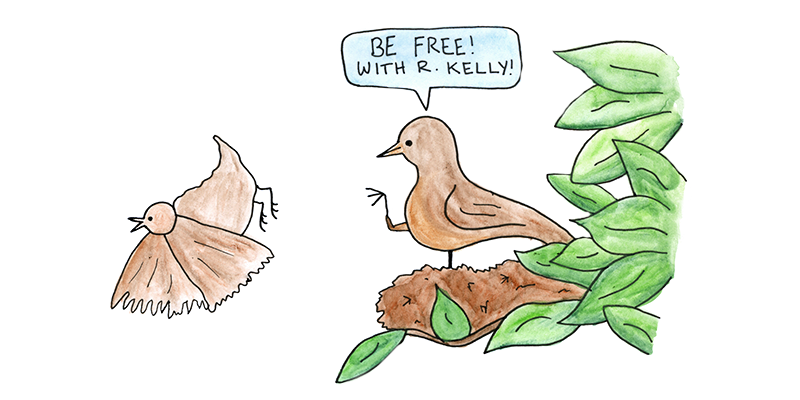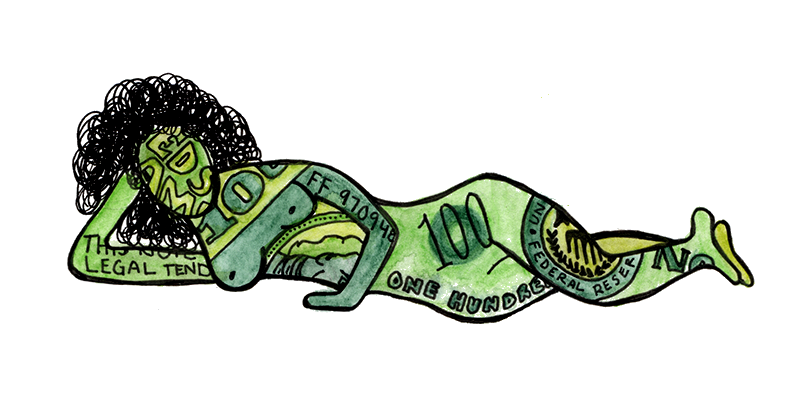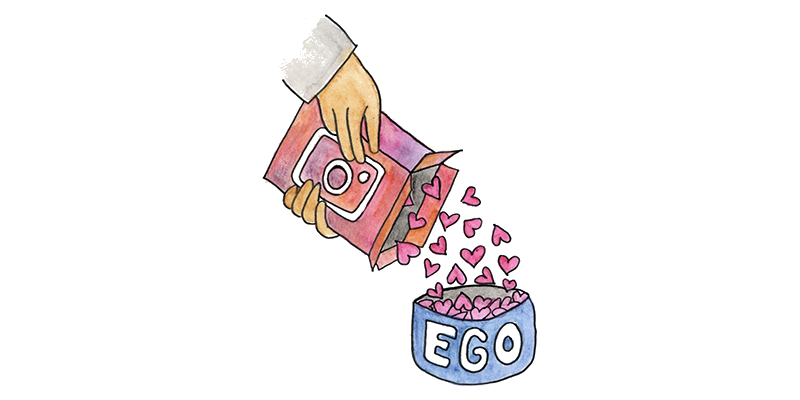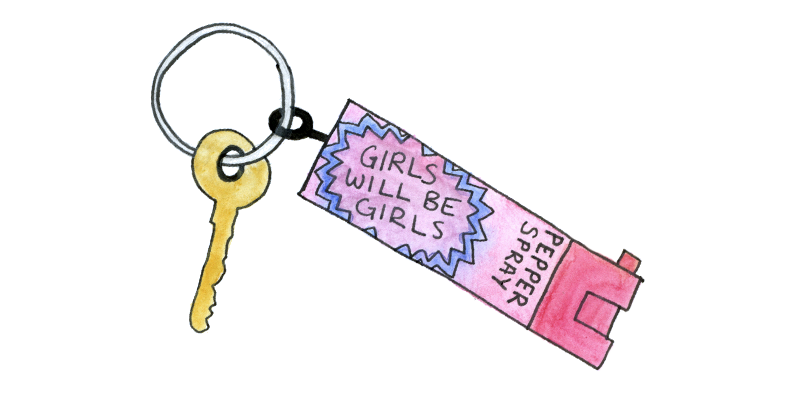A few months back, a story broke about R&B singer R. Kelly’s alleged cult. There was, of course, an immediate divide between those who supported the singer and those who believed his career should have ended decades ago due to similar accusations. The situation reminded many of Taz’s Angels, an alleged escort service/prostitution group out of Miami which rose to fame via social media. Prostitution rings and “harems” are not as uncommon as many of us would like to believe, but these two cases are unique because they have the allure of fame. In the age of social media, fame has become a drug as addictive as cocaine. Much like the substance, fame maintains a look of sugary-sweet innocence while eating people alive from the inside out. Celebrities become idols, worshipped for anything from winning a Grammy to buying a toothbrush for themselves.
Social media has become a new avenue for the average Jane to create her own brand and become self-employed, but the cost of this is often using images from your personal life to grow an overly devoted following. We are all constantly being pushed: follow her, like this, buy that. It is to the point that if you say you don’t have social media, people often think that you are lying. At its best, social media brings us closer to the people we love, whether we know them in real life or not. There is a point, however, and society has reached it, where close becomes too close, particularly because we all try to only show the best of ourselves on the internet. Just read the comments of any celebrity or internet-famous person and you’ll see how mere humans have been exalted to the status of gods and goddesses. We have moved beyond forming strong opinions about people we don’t know, which is odd enough in itself. We are now in the realm of idolizing these people to the point where we often refuse to hold them accountable for their wrongdoings. This type of worship can have very dangerous consequences.
In the case of R. Kelly and Taz’s Angels, devotion plays a role on two levels. Firstly, there is the devotion that fans of the singer have had for years, managing to ignore allegations of child porn and statutory rape for the sake of a few catchy tunes. It is important to note, also, that R. Kelly’s fan base is largely women. Secondly, there is the devotion of the women involved in these situations to these men. Reports indicate that the situation at R. Kelly’s property is a harem or cult. The understanding is that six women between the ages of 19 and 26 live in a home owned by Kelly. Every aspect of their lives is controlled by the self-proclaimed “pied piper of R&B” including contact with their families, when they eat, and when, and with whom, they have sex. Sexual encounters are allegedly recorded and broadcasted among Kelly’s friends. In the case of the recent headline, it seems the young woman involved was lured into the house under the pretense that she would be given a music career. There have been welfare checks, but no charges have been filed because the women are of age and insist they are there willingly.
As an outsider, it is impossible to determine how much of this is true but R. Kelly has a well-documented past of dangerous behavior when it comes to young women. In 1994, he married 15-year-old R&B singer, Aaliyah, with a forged marriage certificate stating she was 18. In ’96, Kelly was sued by a woman named Tiffany Hawkins, who stated that when she was 15, he “engaged in inappropriate sexual conduct with [her] included [sic] but not limited to engaging in group sexual intercourse with [her] and other minors.” Kelly countersued but ultimate settled the initial lawsuit for an undisclosed amount of money. The early 2000s were speckled with anonymous tips about Kelly’s participation in sexual misconduct, a video showing Kelly having sex with a girl who was later revealed to be 14 years old, 21 counts of child pornography, and a forced abortion after allegedly impregnating a 17-year-old, to name a few occurrences.
In addition to this sordid history of abuse allegations, there is something else he has: power, money and status. The girl in this recent report was not a wayward, destitute teen. She was sent there by her parents with the hope of benefiting from R. Kelly’s success, despite the many public accusations that have been made about his predatory behavior. It says something, something very unpleasant, about our culture that parents are willing to take a chance with their daughters’ wellbeing for a taste of fame.
The Taz’s Angels situation is slightly different, but the essential elements remain the same: It is a group of girls living in a home, all dedicated to serving one man. Since their rise to social media fame, the numbers of the group have dwindled from as many as eight down to two. The remaining girls are Cat, the oldest, and Annabella, better known as AB. One visit to Taz’s Angels social media and it is easy, in many ways, to see how young women get sucked into it. The girls appear to be, above anything, enjoying life and living on their own terms. Their Instagram account is full of twerking videos, drugs, alcohol, and bad bitches in bikinis. The girls refer to themselves as “Sister-Wives”, completely devoted to their “boyfriend” Taz. From the outside, it could appear to simply be a polyamorous relationship with various girls coming and going of their own free will. However, according to various accounts, the group is an escort service for high-profile celebrity clients. Reports state that when girls join the house they are forced to dedicate their social media to the group and have limited contact with outside family and friends.
Sex work, by definition, includes any type of sexual labor performed for cash payment. Most sex workers are not wealthy. The average porn star or prostitute does not live in the lap of luxury, and though they may be able to provide a decent life for themselves, they are susceptible to various dangers because of the work and lack of insurance or other legal protections. As a highly stigmatized profession, sex workers often don’t even have social protections, like inclusion in the #MeToo movement and other feminist campaigns. Experienced prostitute and webcam model Melanie Hill breaks it down perfectly in an article for Time, “They don’t want to include women like me. They’ll say we’re just whores anyway — ‘How can you sexually assault a whore?’ I’ve had that said to me multiple times.” This is a common and dangerous belief: that people who chose to participate in sex work for a living are inherently “asking for it.”
Though most sex workers live modestly at best, the lifestyle of easy fame and apparent luxury shown on the Taz Angel’s account or implied by signing a deal with R. Kelly might be especially attractive to a young girl coming from a background of poverty or an abusive family. The youngest of Taz’s Angels, AB, hails from the Dominican Republic. She reveals that she does not have the greatest relationship with her mother. In a video on one of their Instagram accounts, AB talks about how she is meeting up to have lunch with her mother but how she is wary of it because her mother always asks her for cash. Situations like this are not uncommon for many girls with a poor background where their beauty and sexuality might be the only aspect of themselves they were taught to see as valuable.
Which leads to another obvious factor of the allure: the money. In the right light, as Taz’s Angel’s social media can be deemed, prostitution can seem fast and easy and harmless. From the outside, it appears there is a desirable lifestyle that can be achieved if you play your cards right. Only when you arrive on the scene do you realize that you can never truly play your cards right if they deck is rigged. There is no real money-making opportunity. If you are allowed to leave, you leave with what you came, which is most likely nothing.
The Taz’s Angels account has a following of one million devoted fans. Considering the popularity of Instagram among teenagers, particularly teen girls, it is fair to assume they make up a sizable number of the fan base. To an adult, it may be very clear exactly what is going on in Taz’s house, even if it is never explicitly stated; however, a teenage mind might not interpret the images in the same way. Young girls use social media to figure out what’s cool and sexy. It is a major part of how teenage girls decide who they want to be. Image-driven sites like Instagram are used to keep up with beauty trends, celebrities, and the internet-famous. These people are marketing a lifestyle, be it through skinny teas or sex, drugs, and alcohol, like the ladies of Taz’s Angels. And while not everyone involved in the promotion is involved in sex trafficking, the idea is that for unprotected girls, trying to take advantage of the opportunities that marketing sexuality on social media offers can make them more vulnerable to predatory men. The solution to this, in my opinion, is not suppressing the expression of the girls or squashing the viable opportunities social media can provide, but rather addressing the issue of predatory men.
There is a story that has been sold to young girls about older men for as long as movies and television have existed, if not before. I know few girls who have fallen for it at some point or another: the belief that an older man will treat you better, understand you more, and share your intellectual level, unlike your male counterparts of the same age. I am only a decade removed from the hallways of high school, but I remember believing this myth wholeheartedly. Maybe there are some true love stories that involve a younger woman and an older man, but for the most part, older men take advantage of young girls. Men spend years degrading, demeaning, and damaging any woman that will give them the time of day, even women they perhaps truly love, because the culture allows it. Young girls are the easiest prey because they still believe in fairy tales and often have limited or no sexual experience. It is why the trope of the overprotective father and older brother exist. Men are overprotective of the women in their lives because they know “how men are.” And when young girls are not protected by whomever is supposed to be looking out for them, they are vulnerable to the whims of predators.
I think often of the ways young girls around me become victims to these dangers. It is not in the “glamourized” sense of R. Kelly’s cult or Taz’s Angels. There are no mansions, hotel suites, or expensive alcohol involved. This is the difference, I guess, between being an escort and a prostitute. What is interesting to me, though, about sex work is that if you remove the dangerous men from the equation, the pimps, I mean, maybe that lifestyle that Taz’s Angels portrays would be achievable. If prostitution were legalized, the women who end up doing this work would be there by choice, not because they ran into a dead end or fell down the rabbit hole of a pimp’s charm. They would have authorized protection, not just men claiming to look out for them while actually taking advantage of their labor. They would be compensated fairly and have agency over their own life. But, as with most things, prostitution is a game controlled by men and that, more so than the sex work itself, is where things get dangerous.
The term “daddy issues” is often thrown around when we talk about young girls who do almost anything other than sit at home and read. It is used a lot when we talk about sex workers. It is also used when we talk about young girls who date older men. “Daddy” is a word used frequently on the Taz’s Angels page. It is interesting to me because fathers are often described to be a girl’s first love. It is said that women will naturally be attracted to men who treat them as their fathers treated them, or as they witnessed their fathers treat their mothers. By the time I was a pre-teen and old enough to pay attention to these things, I didn’t live with either of my parents, so I can’t comment from personal experience. But the question lingers in my mind: If so many young girls end up in abusive or borderline-abusive relationships with men, then this must be bigger than any individual relationship between a father and his daughter. This is more than just girls picking bad boys or women picking bad men.
There is a level of abuse from men that is deemed acceptable in society. There is a line that’s drawn — certainly it is not “okay” for a man to kill a woman — but the culture implies often that a man can rough a woman up a bit with little to no consequence. Rapes go unreported every day because women fear that they will not be believed or worse, will be blamed. Phrases like “boys will be boys” are embedded in the culture, and everyone who is not a “boy” has to figure out how to survive in a world that tells them abuse at the hands of a man is inevitable and thus acceptable. Let’s also not ignore the type of abuse that involves no hitting at all, but instead manipulating the mind, which is easier to do the younger the girl is. The line can also move based on how much money and social capital you have. Taz and R. Kelly are examples. So are Chris Brown, Charlie Sheen, Woody Allen, Bill Cosby, Johnny Depp, and many others.
Social media has made it even harder to convince girls that the world does not revolve around physical beauty and romantic relationships. For years, magazines and television reinforced the status quo, but social media has pushed us past that, highlighting impossible beauty standards and “relationship goals” based on pretty pictures. How do we teach girls that they are beautiful but that that beauty will attract people who will be abusive? How do we teach them to love wholeheartedly, but that love might cause them to be used? How do we teach young girls that they may be smart, but smart girls can still be manipulated? The thing is, we already teach girls as much as we can. The issue is that we don’t hold the boys to the same standard. We teach men that abuse is acceptable and love is a tool to get what you want. As a society, we are dedicated to things that promote abuse towards women. It is so difficult not to be — the images and sounds are everywhere. We are quick to distrust women, especially young ones. This is how R. Kelly persists, his career fueled largely by the dedication of women. The same applies to Taz’s Angels and the young girls that devoutly follow them on social media. I don’t have the answers, but I think maybe they lie in not only teaching girls how to avoid danger but teaching boys how to not be dangerous. It is no easy task — there is so much imagery and media to fight — but it is a battle worth engaging in if we want to see a strong, intelligent future female population with the male counterparts to match. •
